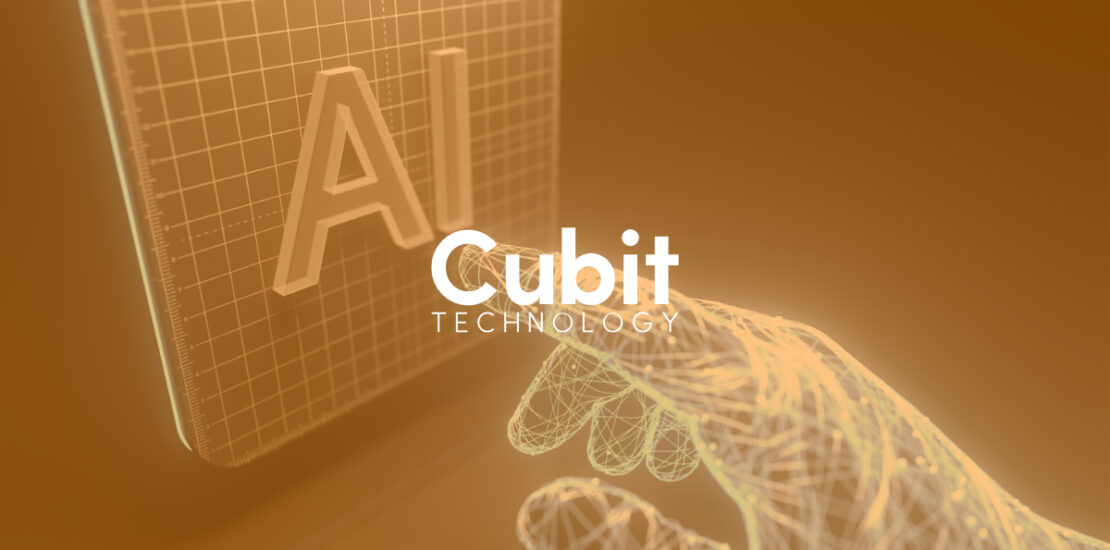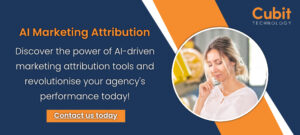AI-Driven Marketing Attribution: Understanding Campaign Effectiveness
- 2 October 2023
- Posted by:
- Category: Blogs

Discover campaign efficiency with AI
Marketing agencies stand to derive big benefits from using AI-driven marketing attribution tools. Not only do these tools pinpoint which campaigns and methods are performing the best, they also optimise resource allocation and assist with giving a crystal-clear picture to clients about the impact that your efforts are having.
AI technology in the marketing and creative spaces is driving greater results while using less time and resources. Continuing in our AI technology in marketing series, this piece explores AI-driven marketing attribution, the benefits it can offer, and provides four useful tools that can help with streamlining and empowering this crucial aspect of your marketing.
What is Marketing Attribution and How Can AI Empower It?
While you’re running multiple marketing campaigns across a range of methods and platforms, each of these channels contributes differently to your campaign’s success. Some generate leads, some create purchases and enquiries, and some simply boost brand awareness. Marketing agencies are partly driven by the key question: ‘how much credit is due to each channel for influencing consumers’ decisions across the marketing funnel’?
The quality of the answer to this question empowers marketing agencies to drive improved results and to allocate marketing spend more efficiently. This is where marketing attribution comes into play. Marketing attribution is the process of identifying and evaluating the touchpoints that lead a customer to take a desired action, such as making a purchase or filling out a contact form.
Often, marketing attribution is conducted as a linear process, done by creating first and last click attributions and any of the points in-between. AI-driven attribution is able to derive more dynamic and lateral insights, including time-sensitive weightings, more granular tracking and mapping of different customer journey patterns, as well as deeper cross-channel analysis that recognises the dynamic synergies between different channels.
In short, AI-driven attribution adds more depth and scope to analysing the success of marketing campaigns by offering a more precise, data-driven and holistic approach to it.
Best Practices for AI-Driven Marketing Attribution
Now that we understand the significance of marketing attribution, let’s explore some best practices for implementing AI-driven marketing attribution successfully, followed by some tools that can help you to implement them and access the benefits that AI-driven marketing attribution can offer.
Data Integration: Ensure all your data sources, including website analytics, CRM data, and advertising platforms, are integrated together on a single platform. AI-driven attribution relies on comprehensive data to provide accurate insights.
Multi-Touch Attribution Models: Instead of relying solely on single-touch attribution models (like first-click or last-click), adopt multi-touch attribution models. These models assign credit to multiple touchpoints along the customer’s journey, providing a more holistic view of campaign effectiveness.
Customise Attribution Models: Tailor your attribution models to match your business goals and customer journey. Different industries and businesses may require different models to capture the nuances of their marketing efforts.
Continuous Monitoring and Optimisation: AI-driven attribution is an ongoing process. Continuously monitor and optimise the attribution models that your AI is utilising to adapt to changing customer behaviour and marketing trends.
Segmentation: Segment your audience based on various criteria, such as demographics, behaviour, or location. AI can help you analyse the data and understand which segments are responding best to your campaigns.
The Benefits of AI-Driven Marketing Attribution
AI-driven marketing attribution offers a range of benefits that can transform your marketing strategies. In a nutshell, it improves the accuracy and responsiveness of the insights, which then contributes to improving ROI, increasing personalisation and enhancing your competitive edge.
With the new generation of AI’s ability to harness the big picture and granular details via dynamically analysing vast data sets, it can generate more precise and powerful insights that can optimise conversions. Traditional attribution models can suffer from a time lag, whereas AI-driven attribution models can work around the clock and continually deliver real time insights.
With these insights, the allocation of marketing budgets can be optimised to drive improved results and help to deliver an experience to target audiences that meets their needs by focusing more on the touchpoints that work for them.
Some AI-Driven Marketing Attribution Tools
Now that you’re convinced of the value of AI-driven marketing attribution, let’s take a look at some tools that can help you implement it effectively:
Google Analytics 360
This premium version of Google Analytics offers advanced attribution modelling features that utilise machine learning technologies. It enables marketing agencies to create custom attribution models and provides insights into cross-device and cross-platform user journeys across various customer segments and attributes.
Adobe Analytics
Adobe’s solution provides deep insights into customer journeys and allows for advanced custom attribution models. It integrates with Adobe’s powerful Sensei machine learning framework. Adobe Analytics provides rich features including anomaly detection, predictive analytics, automated customer segmentation, and more.
Attribution App
Attribution app is a specialised tool that offers AI-driven attribution features, including the ability to find fruitful opportunities for campaigns to synergise together, path analysis tools, and multi-touch attribution tracking in one shared platform.
Windsor.ai
Windsor.ai offers a dedicated one-stop platform for collecting, integrating, filtering and visualising marketing data, including multi-touch attribution modelling. It offers marketing attribution software that can assess the monetary impact of each touch-point, channel and campaign in an algorithmic way that gives each of these elements a more accurate, weighted assessment.
Conclusion
For marketing agencies that are yet to use AI-driven marketing attribution tools, they stand to benefit from another powerful tool for sharpening their competitive edge and delivery of great client results. It enables you to understand campaign effectiveness with precision, allocate your budget wisely, and ultimately drive better results. By following best practices and utilising the right tools, you can harness the full potential of AI-driven marketing attribution and stay ahead in the competitive digital landscape. So, don’t wait – start leveraging AI-driven attribution to supercharge your marketing efforts today!
Cubit Technology – Impactful IT Support and Management for London’s Creative Sector
Nestled in the dynamic heart of Central London, Cubit Technology is your foremost destination for a wide range of IT solutions and support services. Located in the bustling city of London, our dedicated team specializes in providing IT support, management, and consultancy services designed specifically to empower businesses within London’s creative sector, including those engaged in marketing, design, and related industries. Our goal is to facilitate your growth and success by harnessing the power of technology.
At Cubit Technology, we recognize the distinctiveness of each creative business, which is why we adopt a tailored and multi-disciplinary approach. We empower creatives to flourish in diverse IT environments, whether it be on-premises, hybrid, cloud-based, or across both PC and Mac setups. Contact us today and elevate your business to new heights within the bustling metropolis of London!
